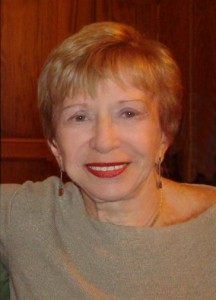You say in your book Eat First - You Don't Know What They'll Give You: The Adventures of an Immigrant Family and Their Feminist Daughter that
you got very involved in testifying on behalf of the 1963 Equal Pay Act. Do you know why this issue caught your attention rather than anything else
(racial discrimination, etc.) you had done in the EEOC?
I wasn’t working at the EEOC when I was asked by Larry Speiser, head of the ACLU’s Washington, DC, office, to write testimony in support of the Equal Pay bill. I was working for the NLRB (National Labor Relations Board) as an attorney at its headquarters in Washington, DC, and, shortly before Larry asked me to do this, I had volunteered to be of assistance to the ACLU’s Washington office. I would guess Larry asked me to do this because I was a woman but I don’t really know. I never asked him.
Do you know why Charlie Duncan
hired you for the EEOC’s general counsel’s office even though you were female?
Was your gender a factor at all?
What do you mean “even though” I
was a woman? I think he may have hired me because I was a woman
because Title VII of the Civil Rights Act of 1964, which the EEOC administered
and administers, prohibits gender discrimination in employment. But I don’t
know why he hired me; I never asked him. Keep in mind that I had been referred
to him by his former pupil at the Howard
Law School,
my friend, Jacqueline Williams.
When you say that “society
exacted a high price from deviants [women who didn’t adhere to the status
quo],” what was this high price?
Society had certain roles it
expected men and women to play and when women or men didn’t conform to those roles,
members of society put pressure on them to conform to society’s expectations
and, if they did not, it treated them as if they were eccentrics or freaks. An
example of this is given in my memoir. When I decided to go to law school
in 1954, about 3% of this country’s law school graduates were women. Law was
not a profession society thought was suitable for women. Thus, when I
mentioned to people that I planned to attend law school, the common response
was to ask me why I would choose to do such a thing. I describe the incident
where my mother took me up to a stranger in a shopping mall and asked this man
if he thought “this little girl” could be a lawyer.
Did you ever feel overwhelmed
at the idea of trying to eradicate sex discrimination in a world that was so
unfriendly to women’s rights?
Yes, but that didn’t prevent me
from continuing with the struggle.
You ask a rhetorical question,
“Why was I engaged in this battle [for women’s rights] against men who had
power when I had none?” Do you know the answer to this in hindsight?
I’m someone who feels compelled
to do something about it when I encounter injustice.
It’s extremely cool that you such
an integral part of the creation of NOW. At the time, did you have a clue how
much influence you would have on history?
No.
Were you ever afraid that your
job would be jeopardized if your activity with NOW was discovered by the EEOC?
I thought it was a possibility
that my underground meetings in Mary Eastwood’s apartment might be discovered
by the EEOC and could jeopardize my job. But I was never “afraid” about that.
You wrote the lead decision
against the airline companies’ discriminatory policies towards stewardesses -
how did you get so involved in this cause? What else did you do regarding the
stewardesses?
I became emotionally involved in
the stewardess cases because as a woman I felt for the stewardesses and was
drawn to the justice of their cause. Airlines terminated or grounded
stewardesses on marriage or on becoming thirty-two or thirty-five and they had
various qualifications for them, such as their height and weight. The lawyer
representing the airlines was named Jesse Freidin and he was a terrific lawyer.
I felt very competitive with him. But, sadly, he died before I wrote the lead
decision.
I became friendly with a woman
named Colleen Boland, who represented the stewardess union, and was a cofounder
of NOW with me. In 1986, when Catherine East, Mary Eastwood, and I planned a
20th reunion for NOW founders in Washington,
DC, I tried very hard to locate
Colleen but was unsuccessful. In 1996, the Veteran Feminists of America (VFA)
planned a program at Barnard
College in NYC to honor
NOW founders. I tried again to locate Colleen before this conference, and this
time I was successful, but I was too late. I connected with Colleen’s daughter
who told me her mother had lived in Cleveland
(where I had lived from the beginning of 1982 to the end of 1985) but had died
three months earlier. I gave a talk about Colleen at that conference, which is
on videotape and is available from the VFA.

No comments:
Post a Comment